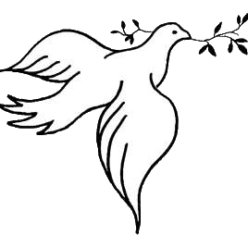“All bloody principles and practices we do utterly deny, with all outward wars, and strife and fighting with outward weapons, for any end or under any pretense whatever, and this is our testimony to the whole world.”
George Fox and others, to Charles II of England, 1660–61
Friends have been known for their peace testimony since the beginning of the Quaker movement in the mid-seventeenth century. George Fox, one of the founders of Quakerism, declared that Friends would refuse to fight in any war for any reason. The commitment to nonviolence is based on the belief that there is that of God in everyone and that every human life is sacred.
Throughout our history, many Quakers have protested against wars, refused to serve in the armed forces if drafted, and sought conscientious objector status when available. To be sure, Quakers have a wide range of beliefs and practices, and many do choose to serve in the military. Nevertheless, the peace testimony serves as a call to conscience as Friends consider how best to work for a peaceful and just world.
Several Friends in Urbana-Champaign Friends Meeting have sought conscientious objector (CO) status over the years. Merlin Taber shared his experiences as a CO (Link to Merlin’s video pending due to technical issues… )during World War II in a talk at the Meetinghouse on November 10, 2019. Although he grew up in a Quaker family, Merlin’s account reveals the angst of a young man faced with a difficult decision–whether to fight in a war or apply for CO status. He chose the latter and served in four different assignments in the Civilian Public Service, a program that provided alternatives to military service during World War II.
Other Friends in our Meeting resisted the draft during the 1960’s, including the Vietnam War, each one living with great anxiety as he waited to hear whether his local draft board would approve his application for CO status, knowing he risked a jail sentence if it was denied. One Friend spent two years in Poland in an alternative service project, teaching English to university students.
More recently, a regular attender of our Meeting became a conscientious objector while on active duty in the armed forces during the 2000s. After returning from deployment he became increasingly uncomfortable with his participation in the military, and his conscience guided him to the conviction that war is immoral. Without prior knowledge of Quakerism and CO status, he sought help from the Center on Conscience and War, a non-profit founded by Quakers, Mennonites, and Brethren to support and defend the rights of all conscientious objectors to war. Ultimately, he was given an honorable discharge from the military.
The U.S. replaced the draft in 1973 with an all-volunteer army, due in part to the divisive Vietnam War years with many young men resisting the draft and people across the country vigorously protesting the war. Currently, eighteen-year-old men are expected to register with the Selective Service, which exists to provide an efficient way to call up young people to fight in a war if the draft is reinstated. Serious consequences befall those who fail to register; they cannot receive federal college scholarships and, in most states, cannot get a driver’s license.
Today the Selective Service does not provide a way to register as a CO. Curt Torell, in his article, Why Talk about Conscientious Objection with Youth (Friends Journal, October 2017), recommends that young people document their commitment to conscientious objection in case the draft is reinstated. The process not only prepares young adults for that possibility, but also helps them examine the peace testimony in relationship to their personal lives.
